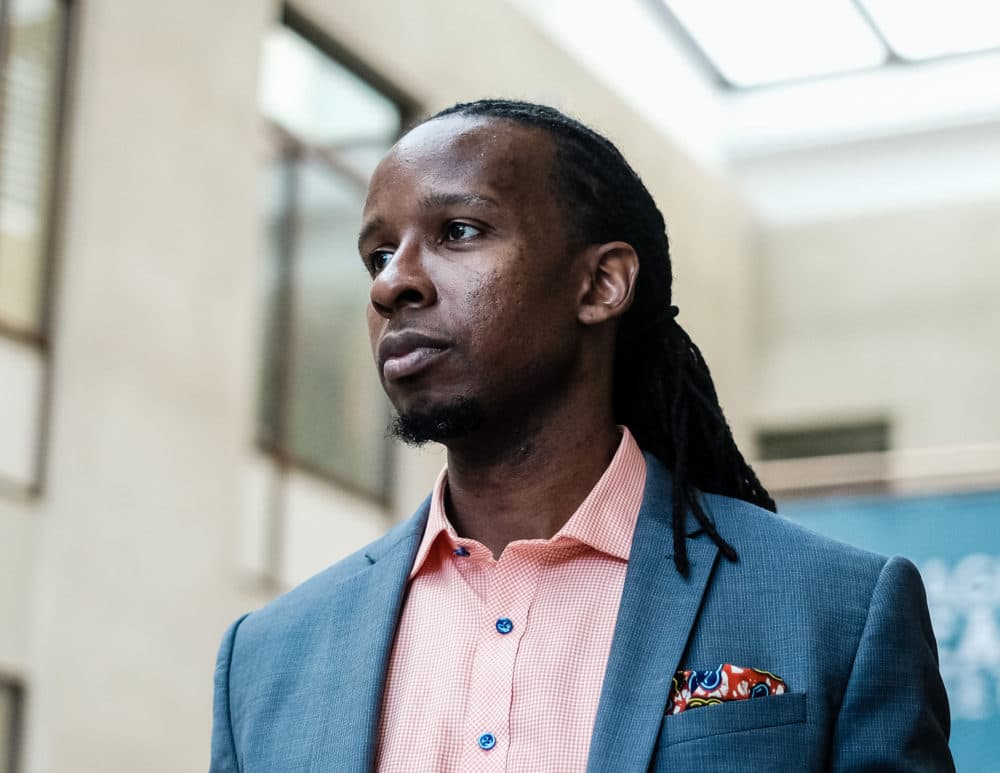Advertisement
Antiracist scholar Ibram X. Kendi on race relations in 2022: 'In many ways, we're still in 1962'

Monday is the Martin Luther King Jr. holiday.
To reflect on King's legacy today, scholar and author Ibram X. Kendi joined WBUR's Weekend Edition host Sharon Brody.
Kendi is the founding director of the Center for Antiracist Research at Boston University. King earned his Ph.D. in theology at BU in the 1950s.
Highlights from this interview have been lightly edited for clarity.
Interview Highlights
On his "snapshot" of race relations in the United States today
"For me, that image would be sort of replaying that time in the early 1960s when Dr. Martin Luther King Jr. spoke out against the filibuster, which he found was blocking civil and voting rights legislation. And I think it would sort of remind us that in many ways we are in 2022, but in many ways, we're still in 1962.
" ... He called it a 'Jim Crow filibuster,' and he recognized that it was preventing us from building a multiracial democracy. And that's precisely what's happening today."
On racial progress and what Kendi calls "King's nightmare," the progression of racism
"We have been taught — and we're especially taught around King's birthday as well as Black History month — that America's racial history is this sort of singular force, this sort of march forward. And at times we're taking steps back. But typically we're taking steps forward. What I find in my research is actually two historical forces — that not only have we in many ways overcome chattel slavery, overcome forms of Jim Crow, but racist policies themselves have become more sophisticated over time.
"Take voter suppression policies. While a century ago, the way they were suppressing votes was ... poll taxes and literacy tests, now the ways they're suppressing votes are, in some states, voter ID laws, or not allowing people to pass out water on extremely long lines, or closing down polling stations, which then increases the number of people. And so the tactics that are being used are more sophisticated, and now the justification is more sophisticated because it's 'voter fraud,' 'electoral security,' which of course, is much more enticing to people because any American thinks it's great or important for our elections to be fair. But in reality, it's just propaganda to substantiate voter suppression."
Advertisement
"Not only have we in many ways overcome chattel slavery, overcome forms of Jim Crow, but racist policies themselves have become more sophisticated over time."
Ibram X. Kendi
On backlash following the widespread racial-justice protests of the spring and summer of 2020, and what drove that pattern
"By June of 2020, one poll found that 76% of Americans were recognizing that racism exists and is a big problem. And that was the highest percentage ever recorded. But by the end of the summer of 2020, that percentage had fallen by double-digits.
"What happened was an incredible propaganda ... assault that basically stated that the problem was not indeed racism. The problem was 'those violent Black Lives Matter protesters who are looting and violently destroying cities.' Because the media tends to report on violent demonstrations as opposed to the upwards of 96% of demonstrations that spring and summer that [were] peaceful, it gave the appearance that there was more violence than there really was.
"And that's the fundamental clash. Like, what is the problem? Is the problem racism itself, or is the problem those people who were demonstrating against it? And since then, there's just been an incredible amount of propaganda to convince the American people that the problem [is] those people who are demonstrating against racism as opposed to racism itself."
On how much of that reaction is an organic belief, and how much is politically manipulated
"In my work, I distinguish between the producers of racist ideas — or, in this case, racist propaganda — and the consumers. And so for me, a lot of that propaganda, a lot of those ideas were manufactured by those whose power and whose policies relied on an unjust, unequal nation. They wanted to convince the American people — everyday people, particularly white Americans — that they were being subjected to oppression, that they were being harmed by these protesters, as opposed to the protesters themselves being harmed by racism.
"For me, a lot of the propaganda was manufactured by some of the most powerful forces in our country. And unfortunately, many people believed it and consumed it, and didn't realize that they were being manipulated, and that they were seeing people who didn't look like them or even who do look like them as the problem, as opposed to those propagandists and the powerful forces behind them."
On how to push back against the "propaganda"
"Study after study shows that inequities and injustices in our society stem not from the inferiorities of particular racial groups, but conditions and policies and structures and practices. So when you recognize that, affirmatively, then when propagandists try to convince us that the problem [is] 'those people,' you know that that's wrong, and you then can sort of gravitate towards those policymakers, those in positions of power who are trying to change those conditions. And you can then support those people so we can create a more healthy, equitable and safe society for us all."
On one key thought as people contemplate King's legacy in 2022
"King, in his ['Letter from a Birmingham Jail'] in 1963, wrote that he suspects that the Negro's greatest stumbling block towards freedom is not 'the Ku Klux Klanner,' as he described, but potentially 'the white moderate.' The person who says, 'I understand your pain, but I disagree with the only solution that could actually bring about the end to it.'
"King was incredibly focused — particularly by the end of his life — [on] supporting the most practical and radical solutions that can bring the end to human pain and misery and militarism, and injustice and poverty and racism. I think that's what made him great — not necessarily a march or speech that he gave, but his vision for creating a different type of world."
This segment aired on January 16, 2022.

